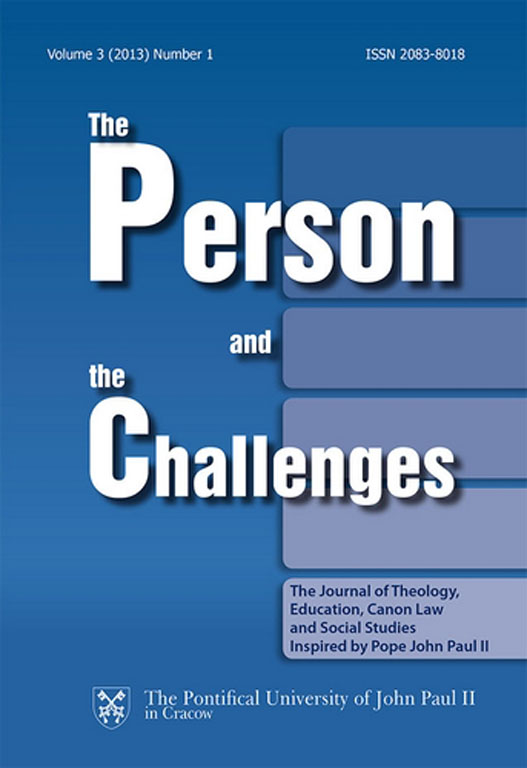Some Remarks on the Theological Interpretation of the Theory of Evolution
DOI:
https://doi.org/10.15633/pch.482Słowa kluczowe:
Creation, evolution, creationism, Bible, theory of evolution, evolutionary creationism, God of the gaps, God and evolutionAbstrakt
This paper deals with the problem of alleged conflict between the theological idea of the creation of man by God and the scientific theories that explain the origin of the human body referring to the process of evolution. It is argued that there is no contradiction between these two domains and that there is no real conflict between the idea of creation and the theory of evolution. At first, the conception of evolution is introduced. Afterwards, the evolutionary creationism is presented as the theological doctrine which claims that God created man, using for this purpose mechanisms of evolution. It is argued that the Biblical account of creation must not be understood literally and that during the lecture of this account one should respect the interpretative principle of St. Augustine concerning metaphorical sense of some Biblical texts. Finally, a “method” of explaining of the emergence of the human body by a direct action of God (“God of the gaps”) is criticized.
Bibliografia
Ayala F.J., The Big Questions: Evolution, London 2012, Quercus Publishing.
Berry R.J., Bóg i biolog. Wiara a nauki przyrodnicze, Kraków 2005, Wydawnictwo WAM.
Berry R.J., God and Evolution: Creation, Evolution and the Bible, Vancouver 2001, Regent College Publishing.
Brzegowy T., Kosmologia (kosmogonia) biblijna, in: Duch i Oblubienica mówią: „Przyjdź”, W. Chrostowski (ed.), Warszawa 2001, Vocatio, p. 70–74.
Coyne J.A., Why Evolution is True, Oxford 2009, Oxford University Press.
Craig W.L., Moreland J.P., (eds.), Naturalism: A Critical Analysis, London 2000, Routledge.
Darvin C., On the Origin of Species, London 1859, John Murray. Gordon B.L., Dembski W.A. (eds.), Nature of Nature: Examining the Role of Naturalism in Science, Delaware 2011, ISI Books.
Heller M, Drożdż M. (eds.), Początek świata – Biblia a nauka, Tarnów 1998, Biblos.
Heller M., Filozofia przypadku. Kosmiczna fuga z preludium i kodą, Kraków 2011, Copernicus Center Press.
Heller M., Ostateczne wyjaśnienia wszechświata, Kraków 2008, Universitas.
Heller M., Pabjan T., Elementy filozofii przyrody, Tarnów 2007, Biblos.
Heller M., Życiński J., Dylematy ewolucji, Kraków 1990, Polskie Towarzystwo Teologiczne.
Jan Paweł II, Encyklika Fides et Ratio. O relacjach między wiarą a rozumem, Tarnów 1998, Biblos.
Klosowski K., Pomiędzy ewolucją a kreacją, Warszawa 1994, Wydawnictwo ATK.
Mayr E., What Evolution is, New York 2001, Basic Books.
McMullin E., Ewolucja i stworzenie, Kraków 1993, OBI.
Merrell D.J., Evolution and Genetics. The Modern Theory of Evolution, New York 1962, Holt, Rinehart and Winston.
Montenat Ch., Roux P., Plateaux L., Odkrywanie ewolucji w stworzeniu, Poznań 1993, Wydawnictwo W drodze.
Ruse M., The Darvinian Revolution, Chicago 1999, The University of Chicago Press.
Weiss K.M, Buchanan A.V., Genetics and the Logic of Evolution, New York 2004, John Wiley & Sons.
Życiński J. (ed.), Sprawa Galileusza, Kraków 1991, Znak.
Życiński J., Beyond Necessity and Design: God’s Immanence in the Process of Evolution, „CTNS Bulletin“ 22 (2002), p. 3–10.
Życiński J., Christian Theism and Cosmic Evolution, „Revista Portuguesa de Filosofia” 61 (2005), p. 211–233.
Życiński J., Evolution and Christian Thought in Dialog according to the Teaching of John Paul II, “Logos. A Journal of Catholic Thought and Culture” 9 (2006), p. 13–27.
Życiński J., The Rationality Field and the Laws of Nature, in: Wyzwania racjonalności, S. Wszołek, R. Janusz (eds.), Kraków 2006, WAM, p. 87–101.
Życiński J., The Anthropic Principle and Theological Interpretation of Nature, “The Review of Metaphysics” 41 (1987), p. 317–333.
Życiński J., Bóg i stworzenie. Zarys teorii ewolucji, Lublin 2011, Gaudium.
Życiński J., God and Evolution. Fundamental Questions of Christian Evolutionism, Washington 2006, The Catholic University of America Press, (Bóg i ewolucja. Podstawowe pytania ewolucjonizmu chrześcijańskiego, Lublin 2002, Towarzystwo Naukowe KUL).
Życiński J., Wszechświat emergentny. Bóg w ewolucji przyrody, Lublin 2009, Wydawnictwo Naukowe KUL.
Pobrania
Opublikowane
Numer
Dział
Licencja
Prawa autorskie (c) 2013 Tadeusz Pabjan

Utwór dostępny jest na licencji Creative Commons Uznanie autorstwa 4.0 Międzynarodowe.
Autorzy publikujący w czasopiśmie udzielają jego wydawcy zgody o następującej treści:
- Autor zachowuje autorskie prawa majątkowe do utworu, a jednocześnie udziela wydawcy czasopisma zgody na jego pierwszą publikację w wersji drukowanej i wersji online na licencji Creative Commons Uznanie autorstwa 4.0 Międzynarodowe oraz zgody na wykonywanie opracowań, w tym przekładów.
- Autor ma możliwość udzielania zgody niewyłącznej na opublikowanie utworu w wersji, która ukazała się w czasopiśmie (np. zamieszczenia go w repozytorium instytucjonalnym lub opublikowania w książce), wraz z informacją o jego pierwszej publikacji w czasopiśmie.
- Autor może umieścić swój utwór online (np. w repozytorium instytucjonalnym lub na swojej stronie internetowej) jeszcze przed zgłoszeniem utworu do czasopisma.

